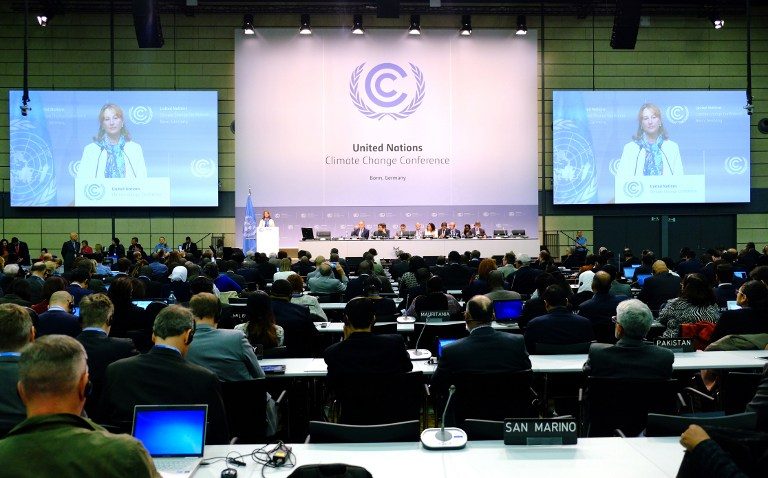SUMMARY
This is AI generated summarization, which may have errors. For context, always refer to the full article.

BONN, Germany – The talks in Germany to flesh out December’s historic global climate deal are probably not at the top of Donald Trump’s agenda this week.
But the diplomats from 196 nations huddled in Bonn are keenly aware of the fact that the “The Donald” is now within spitting distance of the White House – and it’s making a lot of them nervous.
It’s not hard to see why.
The last Republican standing in the US presidential race has described climate change as a hoax perpetrated by China to gain competitive advantage in manufacturing over the US, an eccentric theory even among climate skeptics.
More recently, he said he was “not a big fan” of the Paris Agreement, the fruit of two decades of stop-and-go (but mostly stop) wrangling between rich and developing nations.
“I will be renegotiating those agreements, at a minimum,” Trump told Reuters in an exclusive interview last week, betraying an unfamiliarity with the UN’s consensus-based process.
“And at a maximum I may do something else.”
Under the Paris accord, 196 nations have pledged to hold global warming to well under 2ºC (3.6ºF), and to help poor countries cope with the impact of climate change while weaning their economies off fossil fuels.
Sidestepping a recalcitrant Congress under Republican control, US President Barack Obama has used executive power to aggressively confront global warming at home and abroad.
Especially during his second term, the US, along with China, has been a pillar of the tortuous – and sometimes torturous – UN talks.
The prospect of a Trump presidency precisely at the moment when nations are inching towards ratification of the delicately balanced deal sends shivers down the spines of negotiators here.
When asked what worried him most at this stage, Seyni Nafo, climate ambassador for Mali and president of the Africa Group, snapped: “Trump winning the election.”
It is at least reassuring, Nafo added, that – according to the rules – it would take four years for the United States to withdraw from a ratified treaty.
Locking in the US
France’s top climate diplomat, Laurence Tubiana, agreed that Trump in the White House could do serious damage to the new climate regime.
“If the US government is implacably hostile to the Paris Agreement, it won’t help,” she told journalists on the sidelines of the talks.
“But I don’t think it will derail it,” she added.
Historical precedent, however, is not especially reassuring.
The Kyoto Treaty – which dangled in limbo for 7 years before entering into force – was fatally weakened from the moment the administration of George W. Bush refused to ratify.
Japan, Russia and Canada later pulled out.
The Paris Agreement is on track to enter into force in record time, possible before the end of this year.
Indeed, a lot of countries would like to see it locked in – with the US on board – before a new president is sworn in on January 20.
In Bonn, some negotiators have sought solace in the idea that public opinion would discourage Trump from reneging on the US commitment.
“There’s election rhetoric, and there’s the real world,” said Elina Bardram, the European Union’s top negotiator.
“The US public has also been very pleased with the climate agreement.”
Trump is scheduled to address an industry energy summit in Bismark, North Dakota on Thursday.
The fact that he has sought counsel from a known climate skeptic and fracking advocate, US Republican Representative Kevin Cramer of North Dakota, has not escaped notice here.
But the danger for the global climate pact may be less what Trump does within the UN forum than at home, said Alden Meyer, director of strategy and policy for the Washington-based Union of Concerned Scientists.
“I don’t think a president Trump would necessarily pull the US out of the Paris Agreement,” he told Agence France-Presse.
“It is more that he would not take the domestic actions needed to meet the US target.”
Under Obama, Washington has pledged to reduce net greenhouse gas emissions 26 to 28% below 2005 levels by 2025.
Climate negotiators, however, may take heart in the news that an Irish golf course owned by Trump has cited global warming as the reason for erecting a protective sea wall.
“The evidence for increased storm activity associated with climate change suggests that the erosion will accelerate,” the permit applications reads. – Marlowe Hood, AFP / Rappler.com
Add a comment
How does this make you feel?
There are no comments yet. Add your comment to start the conversation.